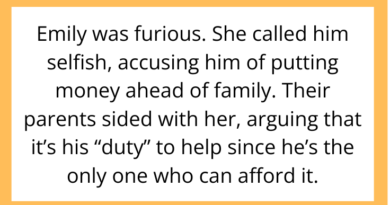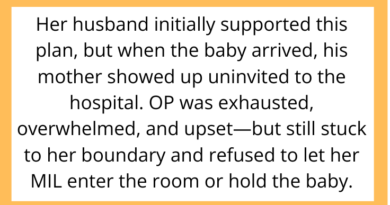AITAH for Not Wanting to Help My Brother Financially Even Though He Helped Me Years Ago?
Family debt—emotional or financial—can feel like an invisible weight. A recent post on r/AITAH asked a question many people secretly grapple with: If someone helped you in the past, are you obligated to help them later, no matter the circumstances?
This story, shared by a frustrated sibling, dives deep into loyalty, personal growth, and the limits of familial obligation. Let’s unpack this complex situation and explore whether setting financial boundaries makes someone selfish—or simply self-aware.
The Background: A Favor Remembered, A Debt Assumed

The original poster (OP) explained that several years ago, during college, they hit a rough patch. Their older brother loaned them about $1,000 to cover rent and food, no questions asked. OP was extremely grateful—and repaid every cent within the year.
Fast forward to the present. OP is now financially stable, working full-time with a comfortable income. Their brother, however, recently lost his job and reached out asking for a “temporary” loan of $3,000 to get through the next few months.
OP declined.
They cited personal financial goals, the size of the request, and concerns that repayment wasn’t guaranteed. The brother was shocked and angry, accusing OP of being selfish, ungrateful, and forgetting “who helped you when no one else would.”
This led OP to ask Reddit: Am I really the bad person here?
Debt vs. Obligation: Are They the Same?

One of the most hotly debated aspects of this post is whether OP owes their brother anything beyond what was already repaid. It raises a central question: Does past generosity create future obligation?
The short answer? Not necessarily.
-
Repayment clears financial debt. Once OP paid the $1,000 back, the transaction was complete.
-
Emotional pressure isn’t a contract. Guilt shouldn’t force someone into giving more than they’re comfortable with.
-
Situations change. Just because you can help doesn’t always mean you should—especially if it disrupts your own plans or peace of mind.
Setting Boundaries Without Guilt

Saying no to family is never easy. There’s often a fear of being labeled cold or uncaring. But healthy boundaries are not acts of selfishness—they are acts of self-respect.
Here are some ways to say no with kindness:
-
Acknowledge the past: “I’ll always appreciate how you helped me.”
-
Be honest about your limits: “Right now, I’m not in a place to lend that amount.”
-
Offer alternatives: “Would you be open to help creating a budget or exploring support programs?”
A firm, kind boundary often prevents future resentment and damage to the relationship.
The Internet’s Verdict

Reddit users were largely on OP’s side. The most upvoted comment said, “A loan is a choice, not a contract for future servitude.” Others pointed out that emotional blackmail—especially from family—is one of the hardest things to say no to.
However, a minority did argue that OP was being too rigid. “You’re not legally obligated,” one commenter said, “but morally, it’s hard to forget where you came from.”
That nuance sparked a larger debate: what do we owe the people who helped us when we had nothing?
What This Story Teaches Us

There are several takeaways here:
-
Kindness doesn’t require a return ticket — If someone helps you without expectation, they shouldn’t expect repayment years later.
-
Boundaries protect relationships — Being honest about what you can’t give is often better than giving and building resentment.
-
Generosity isn’t transactional — True support is given freely, not banked as leverage.
Ultimately, your financial future and personal well-being matter, even when family is involved.
Final Thoughts: Are You Selfish, or Just Self-Aware?

Not wanting to lend money doesn’t automatically make you the villain. What matters most is why you’re saying no, and how you communicate that decision.
If you’re declining help because you’ve learned to prioritize your financial stability, that’s not selfish—that’s responsible.
If someone uses your past vulnerability as a tool for guilt, it’s okay to push back.
At the end of the day, choosing boundaries over guilt may feel uncomfortable—but it often leads to healthier, more honest relationships.



